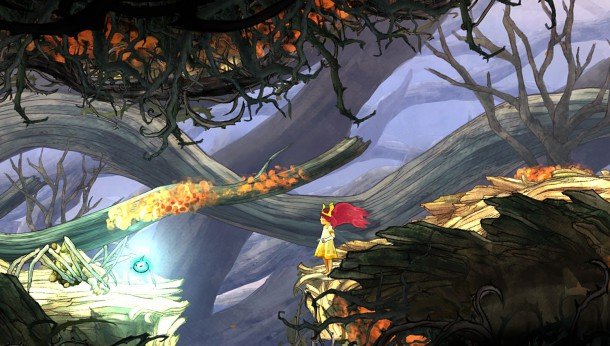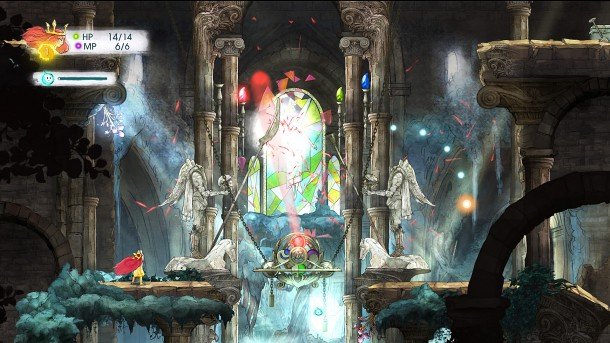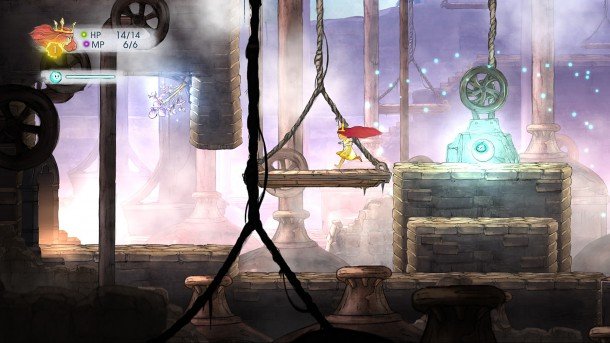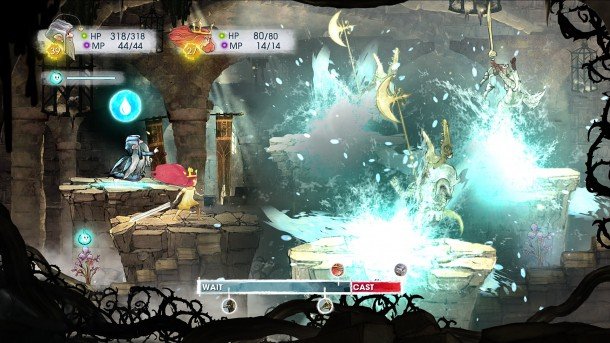Child of Light hands-on: an RPG fairy tale told entirely in rhyme

Child of Light is Ubisoft's playable poem. It's a fairy tale led by Far Cry 3 director Patrick Plourde, informed by JRPG combat and built using the same proprietary UbiArt Framework as Rayman Legends. It's also an actual poem (or rather, an anthology of poems), so I went to meet the lead writer Jeffrey Yohalem to talk sonnets, rhyme schemes and fairy tale trauma.
"It starts with something you're trying to convey about society and the world today, because that's what fairy tales are about," he tells me. "What's going on in culture, that you can miss the path easily and in life there are all these places where you can wander off the path and end up in a situation where you're lost. A fairytale helps guide you in an entertaining way as opposed to someone sitting there saying 'Here's what you should do'."
In the case of Child of Light the story begins in Austria at Easter, 1895 with the introduction of Aurora. "She's the daughter of a duke," explains Yohalem. "We wanted to create a game with a little girl as a protagonist because you don't see that very often and all of the great fairy tales that I read growing up had a young girl as the lead."
He goes on to cite a raft of well-loved children's books each with a little girl in the main role - Philip Pullman's His Dark Materials trilogy, Lucy from the Chronicles of Narnia (Susan and her eventual fondness for lipstick and nylons don't get a mention) and Edward Eager's books. For me, Aurora also has touches of the Little Princess from Tony Ross's books - barefoot and determined. Breaking a little with Ross's character, in my version she's also wielding a massive sword which I've modded so it electrocutes everyone it slashes in the turn-based skirmishes.

As with RPGs in general and JRPGs in particular, levelling up, exploring worlds and facing tougher foes all function as metaphors for growing up. "The rules of the game are what connect the rules of the storytelling." is how Yohalem phrases it. With Aurora it's a relatively straightforward process. Her skill trees radiate from a central point and you can pursue them as you prefer. Other characters offer a different slant. For example an acrobat seeking her brother joins your party and her skill trees start at a number of different points. "She's much more scattered," agrees Yohalem, "as you can see in the writing she always messes up the rhyme scheme."
As you might have gathered from that last remark, the whole game is written in rhyming verse. Two hundred pages of the stuff.
The intention was always to make a lyrical game, but early on that stopped being limited to the art and music and folded in the script. "We thought 'What if we make it lyrical as well in the writing?' so I went in search of one of my favourite poems - The Rime of the Ancient Mariner. That's written in epic ballad form. I was looking for something that was not childish but also you feel the rhythm.
Keep up to date with the most important stories and the best deals, as picked by the PC Gamer team.
"For me every line rhyming was childish and something like Alice in Wonderland which is ABAB, every other line rhyming was too rhyme-y. Epic ballads are [often] ABCB then couplets for emphasis. That really hit it and feels adult."

It's a technique which generally works but occasionally the tone seems a little off. The team has worked to create a proper fairy tale and from the opening chapters I saw there are moments of sass in the dialogue which feel peculiar, disrupting the lyricism. It's an oddity which has a visual equivalent. If you're familiar with Rayman Legends, Child of Light's adoption of UbiArt Framework to create the levels can occasionally give the sensation that you've stepped into a modded version of Rayman's world.
In addition to the script for the game you'll also pick up confessions as you travel. They're little snippets of writing with a far more complex structure than the main narrative. "I decided right at the beginning I wanted the confessions to be sonnets," Yohalem says. "My feeling throughout my life both as a reader and a writer is that you don't talk down to anyone. The best works are ones you have to reach into rather than works saying 'Look at me! I'm for you, little kid!' The best books are about the children who do things their parents don't want them to do and go on wild adventures and the author never once stops and says 'Oh, are you not following this? Let me make it simpler for you.'"
The PC build wasn't ready when I played but parts of the version in the hands-on session followed the idea of not simplifying ideas a little too happily meaning some of the concepts such as the oculi which are gems used to augment weaponry and armour felt under-explained. There also didn't seem to be a way to look up the recipes for previously crafted gems you wished to recreate.
Child of Light includes another fairy tale sensibility: a note of brutality. It's present from the prologue where Aurora apparently dies before entering this different realm and recurs slightly further into the game in a scene where her father is still distraught over the "death" of his daughter. It's not the same brutality as you'll find in The Little Mermaid, with the bleeding feet cut by imaginary knives and the conspiracy to murder, but it's not an insubstantial subject area.

"We treated it very delicately," says Yohalem. "Life is very bittersweet. There are tons of moments of joy and there are also very harsh scary situations we end up in. If this was going to be a real fairytale I needed to embrace both."
Aurora's story appears to have been Yohalem's attempt to reconcile what he sees as the desire to be closer with others and the divisions which prevent that. He speaks of "harsh historical events and intense situations" which split us apart. "For me it's a game about that fragmentation and about how leaving one's tribe can be both positive and negative."
It's at this point that Aurora becomes overtly personal to Yohalem. "It deals with something I've had a lot of trouble facing in my life. When I was a kid I was with my family all the time. I really didn't like spending the night at friends' houses, I didn't like being away from that space. There was a magical safety net created around me by my family where I felt like all of these stories I read about terrible things were stories.
"Then I moved to a completely different country [Canada] to follow my passion and my work in videogames. I've been an outsider in that country which was a big surprise for me. I didn't think about how different cultures could be. Not having my family there to support me or any of that safety net at all is a beautiful, exhilarating, scary experience."
Yohalem adds that he hopes Aurora offers players an opportunity to experience a little of that for themselves. "It's not pressuring or saying it's the right or the wrong way to do this but it's giving an experience."

